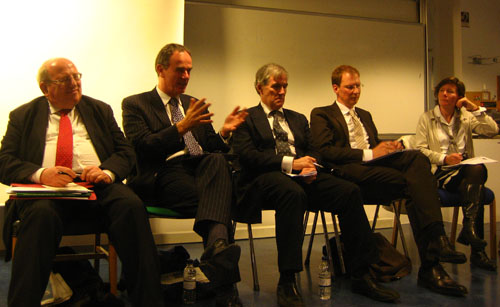 On 6 December 2011 the LSE’s European Foreign Policy Unit hosted the second of ten roundtables on ‘EU Foreign Policy after Lisbon’. In this series policy-makers, experts and other stakeholders are invited to share their views on the EU’s role and impact in international affairs.
On 6 December 2011 the LSE’s European Foreign Policy Unit hosted the second of ten roundtables on ‘EU Foreign Policy after Lisbon’. In this series policy-makers, experts and other stakeholders are invited to share their views on the EU’s role and impact in international affairs.
On this occasion the subject was the role of national parliaments and the European Parliament in the decision-making process of EU foreign policy. The panellists were Lord Teverson (Chairman of Sub-Committee C – Foreign Affairs, Defence and Development, House of Lords), Mike Gapes MP (former Chairman of the House of Commons Foreign Affairs Select Committee), Brendan Donnelly (Federal Trust and former MEP), and Dr Wolfgang Wagner (VU University of Amsterdam). The event was chaired by Professor Karen E. Smith of the LSE.

When it comes to the influence parliaments can exercise in foreign policy, debate is usually centred on more general questions of democratic accountability and control, rather than on policy direction and agenda-setting. In the communitarised sphere of European foreign policy (e.g. external trade and development), Community institutions exercise strong ex ante control. However, when it comes to the so-called ‘core’ of foreign policy – especially its security component – the European Commission and Parliament matter little in the policy process. Accordingly, security policy formed the cornerstone of this roundtable discussion.
Security policy is mostly driven by crisis situations. Due to the time constraints facing governments in such situations, ex ante controls are generally dismissed as impractical. Yet, in view of the sensitive nature of possible military deployment, democratic accountability is seen as a necessity. Interestingly, none of the participants envisaged a strong role for the European Parliament in this regard. The intergovernmental make-up of the EU’s Common Foreign and Security Policy (CFSP) and Common Security and Defence Policy (CSDP) prevents it from exercising a significant control function, a fact that was either simply acknowledged or outright welcomed by the members of the panel. Brendan Donnelly captured the collective view in stating that the CFSP/CSDP is not so much a European policy as it is a multinational one. Accordingly, control should be exercised at the national level. How far national parliaments are able to do that is a matter of contention. As member states sustain widely differing accountability regimes, control is frequently weak, selective and ad hoc. Lord Teverson and Mike Gapes agreed that in the realm of military affairs the disbanding of the Western European Union assembly in 2011 left a void in the accountability regime of European foreign policy. Both Wolfgang Wagner and Mike Gapes proposed inter-parliamentary cooperation as the most promising avenue to reinforce control.
In the end, while there was general agreement that the accountability regime of European foreign policy in security matters is weak, whether this was cause for concern was perceived very differently by the participants. Some saw the dominant role of member state governments in the policy process as sufficient to safeguard accountability, others remarked upon a skewed balance of influence between executives and legislatives. Therefore, the question whether a democratic deficit in European foreign policy exists largely depends on whether one perceives the intergovernmental nature of CFSP/CSDP as bolstering national sovereignty, or rather executive sovereignty.
Moritz Reinsch
PhD candidate, European Institute


